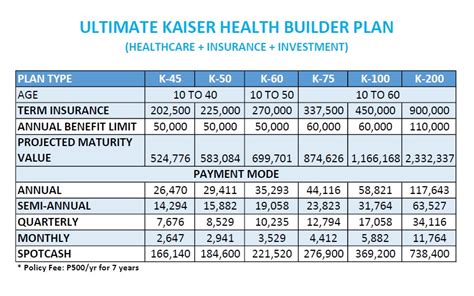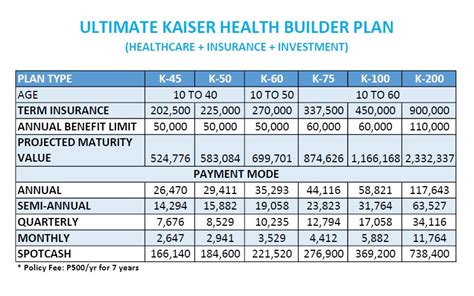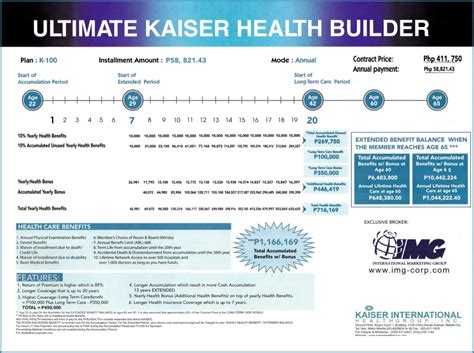Intro
Discover the benefits and features of Kaiser Health Plans, a leading managed care organization. Learn about their affordable health insurance options, extensive network of hospitals and physicians, and emphasis on preventive care. Get informed about Kaisers Medicare and Medicaid plans, as well as their individual and family coverage options.
Kaiser Health Plans have become a household name in the United States, synonymous with quality healthcare and innovative medical practices. As one of the largest not-for-profit health plans in the country, Kaiser Permanente has been at the forefront of healthcare reform, providing comprehensive coverage to millions of Americans. But what sets Kaiser apart from other health plans, and how does it continue to shape the future of healthcare?

History of Kaiser Health Plans
Kaiser Permanente was founded in 1945 by Henry J. Kaiser, a visionary industrialist who recognized the importance of providing healthcare to his workers. Kaiser's innovative approach to healthcare was rooted in the idea of preventive care, where patients received regular check-ups and screenings to prevent illnesses before they became severe. This approach not only improved health outcomes but also reduced healthcare costs in the long run.
Over the years, Kaiser Permanente has continued to expand its services, investing heavily in medical research, technology, and patient care. Today, Kaiser Health Plans cover over 12 million members across eight states, with a network of over 22,000 physicians and 61,000 employees.
Key Features of Kaiser Health Plans
So, what makes Kaiser Health Plans so unique? Here are some key features that set Kaiser apart from other health plans:
- Comprehensive coverage: Kaiser Health Plans offer comprehensive coverage, including medical, dental, and vision care.
- Preventive care: Kaiser emphasizes preventive care, with regular check-ups and screenings to prevent illnesses before they become severe.
- Integrated care: Kaiser's integrated care model ensures that patients receive seamless care, with all medical records and test results available in one place.
- Access to specialists: Kaiser members have access to a network of over 22,000 physicians, including specialists in every field.
Benefits of Kaiser Health Plans
Kaiser Health Plans offer numerous benefits to members, including:

- Cost savings: Kaiser's emphasis on preventive care and integrated care model can help reduce healthcare costs in the long run.
- Improved health outcomes: Kaiser's focus on preventive care and regular screenings can help improve health outcomes and reduce the risk of chronic diseases.
- Convenience: Kaiser's integrated care model ensures that patients receive seamless care, with all medical records and test results available in one place.
- Access to innovative treatments: Kaiser is at the forefront of medical innovation, with access to cutting-edge treatments and technologies.
How Kaiser Health Plans Work
Kaiser Health Plans work by providing comprehensive coverage to members, including medical, dental, and vision care. Here's a step-by-step guide to how Kaiser Health Plans work:
- Enrollment: Members enroll in a Kaiser Health Plan, choosing from a range of plans that suit their needs and budget.
- Primary care: Members choose a primary care physician from Kaiser's network of doctors, who provides routine care and referrals to specialists.
- Specialty care: Members have access to Kaiser's network of specialists, who provide care for specific medical conditions.
- Hospital care: Members have access to Kaiser's network of hospitals, which provide emergency and inpatient care.
Kaiser Health Plans and the Future of Healthcare
Kaiser Health Plans are at the forefront of healthcare reform, with a focus on innovative medical practices and patient-centered care. Here are some ways Kaiser is shaping the future of healthcare:

- Telemedicine: Kaiser is investing heavily in telemedicine, with virtual consultations and remote monitoring to improve patient care.
- Artificial intelligence: Kaiser is using artificial intelligence to improve patient care, with AI-powered diagnostic tools and personalized treatment plans.
- Population health: Kaiser is focusing on population health, with initiatives to improve health outcomes and reduce healthcare costs for entire communities.
Conclusion
Kaiser Health Plans have revolutionized the healthcare industry, with a focus on preventive care, integrated care, and patient-centered care. With its comprehensive coverage, innovative medical practices, and commitment to quality care, Kaiser Health Plans are an attractive option for millions of Americans. As the healthcare landscape continues to evolve, Kaiser Health Plans are well-positioned to shape the future of healthcare, with a focus on innovation, quality care, and improved health outcomes.
What is Kaiser Permanente?
+Kaiser Permanente is a not-for-profit health plan that provides comprehensive coverage to millions of Americans.
What are the benefits of Kaiser Health Plans?
+Kaiser Health Plans offer comprehensive coverage, preventive care, integrated care, and access to specialists.
How do Kaiser Health Plans work?
+Kaiser Health Plans work by providing comprehensive coverage to members, including medical, dental, and vision care.
